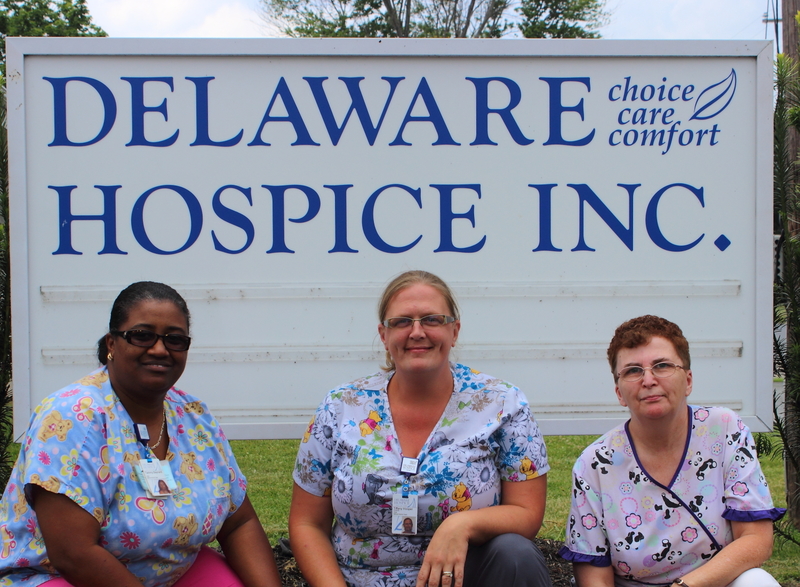“Hello, I’m Carol, and I’m going to give you a bath.”
One of the most important members of a hospice care team is the certified nursing assistant. How these individuals go into a stranger’s home, accomplish their goals of care, and leave families completely devoted to them, requires extraordinary skills and commitment deserving of recognition. National Nursing Assistants Week celebrated these worthy individuals from June 12 to 19.
The primary roles of a Delaware Hospice certified nursing assistant are to provide personal care for seriously ill individuals who struggle with daily hygiene and to support a comfortable and safe environment for home care.
CNA Tiffany Hooper said, “The best part of my job is getting to know the families. We become part of the family, regardless of how long we care for them. It’s wonderful to be welcomed with open arms!”
But there are individuals who haven’t been cared for by anyone outside of the family and who might refuse the help of a CNA. Delaware Hospice’s Pat Cahall said, “As an experienced CNA, you learn to gently work your way into it, depending on each patient and situation. If they’re distant or reluctant, it may take a few visits. But after seeing us and chatting a few times, they get used to the idea. Other patients may want to hug you on the first day. It’s like you’re an angel sent by God to help them. They just love you.”
CNA Tammy Baynard, remembers a gentleman assigned to her. She said, “I spoke to his wife, who told me he probably wouldn’t allow me to do anything. I told her not to worry. The next day I knocked on the door and said, ‘Hi, I’m Tammy with Delaware Hospice.’ It was a good thing I arrived just then, because he clearly needed help getting to his chair. So I got him back in his chair and we started talking. We talked about his children, fishing, and other things. I explained that I was there to help him get a bath, but he said, no, he was fine. I said I would be there three days a week, so when I came back on Wednesday, that he had better be prepared to get a bath or at least to let me shave him. He said, ‘I’ll look forward to seeing you.’ When I told his wife, she couldn’t believe it. She didn’t even think he would let me in the house!”
When Tammy returned on Wednesday, the gentleman was waiting for her. He allowed her to bathe, lotion and shave him. His wife was very pleased, and he told his children how wonderful Tammy was, and how he was looking forward to seeing her on Friday.
Tammy was born and raised in Harrington and now lives in Laurel. She said, “I always wanted to be a nurse, because my older cousin was a nurse. I started my career at Milford Manor, where I was hired and trained as a CNA. It was a struggle, but I liked it. I have worked in this field for 20 years at a couple of long-term-care facilities in Delaware.”
When a colleague moved to Delaware Hospice and she learned more about caring for hospice patients from him, Tammy decided she wanted to make that move as well, and she has been caring for Delaware Hospice patients for the past four years.
CNA Katina Rosario treats new patients with similar respect and patience, emphasizing that the care they receive is their choice - they are in charge. “When I go to a new home, I introduce myself, and let them know why I’m there. I ask, ‘How may I help you today?’ If they refuse care, I might ask, ‘Can I give you a back rub?’ or ‘How about just a shampoo?’ Or ‘You already have your shoes off, so can I wash your feet?’ It’s important to put them at ease, to learn what they like and what they don’t like, and to let them know that they are in control.”
Katina was born and raised in Lewes and now lives in Georgetown. Katina wanted to be a physical therapist, and started out as a restorative aide in a facility’s therapy department, but her path took a different turn when that unit was outsourced, and she became a licensed CNA. While there, Katina began to notice outside nurses and chaplains visiting patients at the facility and wondered who they were. She said, “They were always so nice. I wondered who they worked for and thought that I’d like to work wherever they do. It turns out that they were Delaware Hospice nurses, chaplains and social workers. Everyone I met from that organization was amazing, so I decided to make a move to Delaware Hospice.”
Tammy and Katina exhibited great teamwork with one elderly couple who was living alone. The husband would allow only Tammy to care for him. Katina was simultaneously caring for his wife. Tammy said, “They were no longer able to take care of their clothes, so I would put a load of wash in during my morning visit. When Katina came in later in the day, she would pull them out of the dryer.”
Personal hygiene is not the only responsibility of Delaware Hospice’s CNAs. Tammy said, “We help the caregivers, and we also serve as the eyes and ears for the rest of the hospice care team, reporting any significant changes. Patients and family members see us every day and learn to trust us and confide in us.”
Katina said, “Our greatest challenges are never the patients, but family members who struggle to deal with what’s going on. Everything is overwhelming. Caregivers are trying to work and take care of loved ones, and they don’t know how to. They may think they’re doing everything wrong. We can handle the patients and get our work done. But family members need a lot of emotional support, guidance, and reminders. We praise them and encourage them that they’re doing a good job. We educate, and re-educate, and never tire of telling them the same thing. Our nurses have already explained things, but they may need reminders. ‘Here’s the list and this is how you follow it,’ or ‘It’s very important to keep his or her feet elevated,’ or ‘You must keep the oxygen on, even if you don’t think you look good.’ We remind them that Delaware Hospice is on call 24 hours and not to wait if something is bothering them.”
Tammy added, “We see patients several times a week, so we may be the first to see a change in symptoms. Also, family members sometimes tell their CNAs things they don’t tell others, because we are more like a family member to them. We explain to the family what they should look out for, or what we’ve found and reported to the nurse. We work closely with the nurse and other team members, immediately informing them of any important changes.”
Another benefit of working with Delaware Hospice’s patients and families is an appreciation of how important it is to be prepared for advanced illness. Tammy said, “You don’t want to be in an end-of-life situation unprepared. You learn from others what needs to be in place and the importance of communicating your affairs and your wishes with family members.”
Both Tammy and Katina love their jobs; however, they’ve both been working toward their nursing degrees and look forward to reaching their long-term goals of becoming registered nurses. But until then, they will enjoy caring for their Delaware Hospice patients and families, and hearing the gratitude expressed, like the words of a patient after a vacation time-off, “Oh, I’ve missed you!”
For more information go to www.delawarehospice.org.





















































